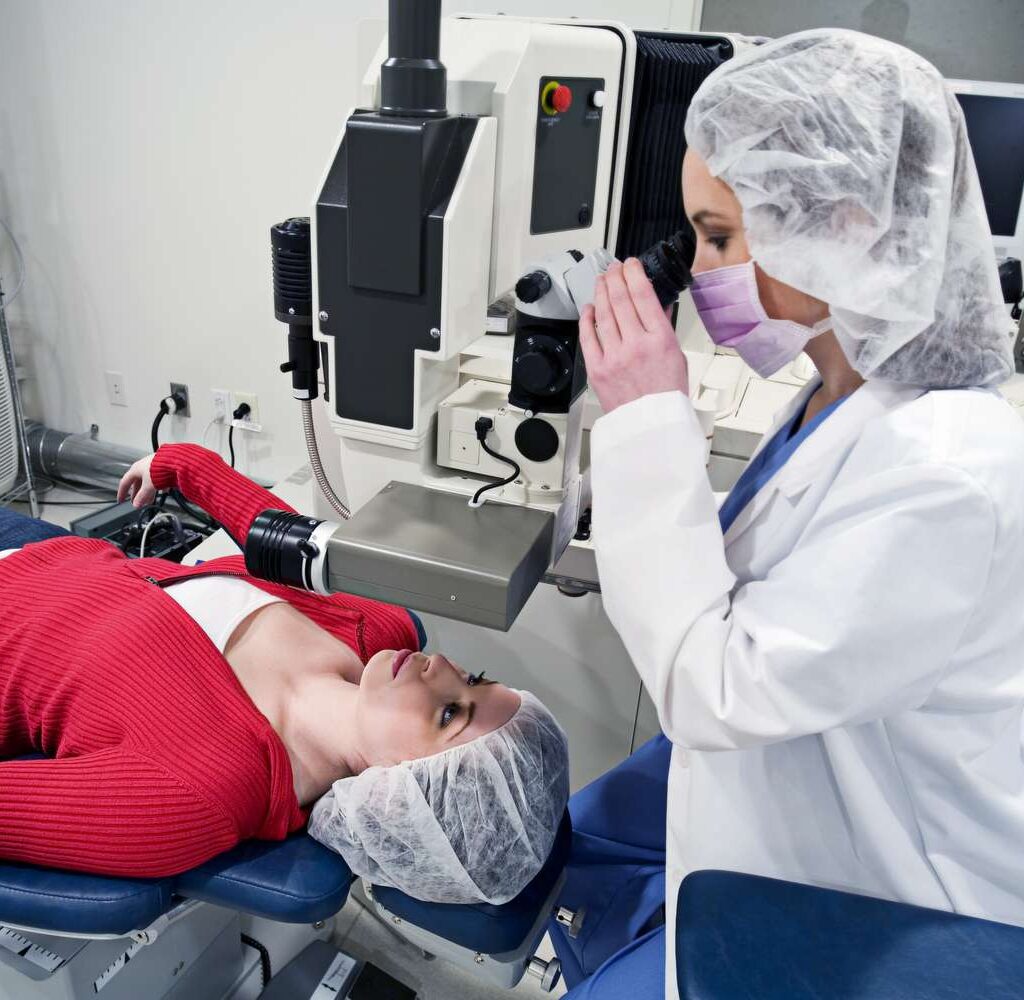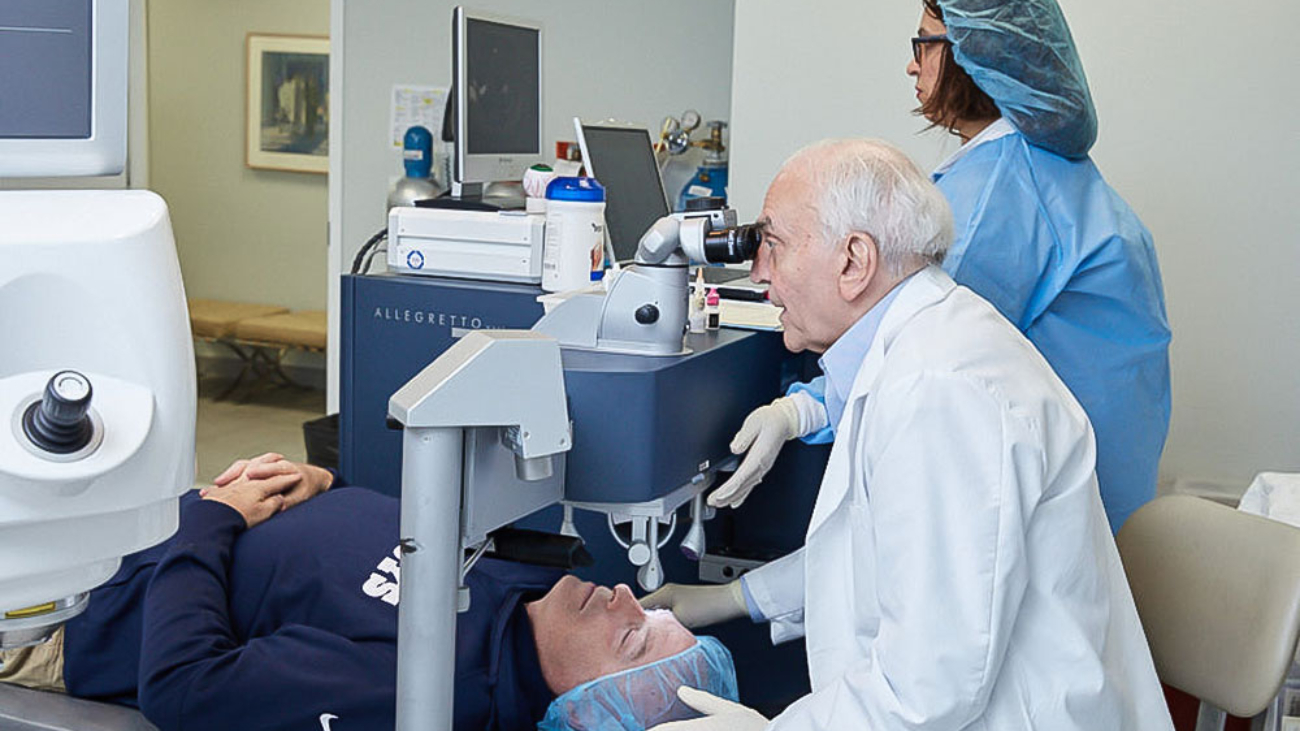In today’s world, where technology is constantly evolving and innovation is at the forefront of medical advancements, it’s no surprise that LASIK eye surgery has become the clear choice for vision correction. Whether you struggle with nearsightedness, farsightedness, or astigmatism, LASIK offers a safe and effective solution to improve your eyesight and enhance your quality of life.
Understanding LASIK Eye Surgery
Before delving into the benefits and advantages of LASIK eye surgery, it’s crucial to understand the science behind this revolutionary procedure and what to expect during the process.
The Science Behind LASIK
LASIK, which stands for Laser-Assisted In Situ Keratomileusis, is a surgical procedure that uses lasers to reshape the cornea, the clear front part of the eye. By reshaping the cornea, LASIK corrects abnormal curvatures or irregularities that interfere with proper vision.
But how does this remarkable procedure actually work? Let’s dive a little deeper into the process. During LASIK surgery, a microkeratome or femtosecond laser creates a thin, hinged flap on the cornea. This flap is meticulously lifted, revealing the underlying corneal tissue. An excimer laser, known for its precision, is then employed to remove precise amounts of corneal tissue, reshaping it to the desired curvature. Finally, the flap is gently repositioned, acting as a natural bandage for the eye.

The Procedure: What to Expect
Understandably, the thought of undergoing any surgery can be intimidating. However, LASIK eye surgery is a relatively quick and painless procedure that offers significant benefits. The entire surgical process generally takes less than half an hour, and most patients experience no pain during the procedure.
Prior to surgery, your eye surgeon will provide specific instructions on how to prepare for LASIK, including restrictions on wearing contact lenses and potential medication adjustments. These precautions are taken to ensure the best possible outcome for your surgery. On the day of the procedure, you will be given numbing eye drops to ensure maximum comfort throughout the process.
Once the surgery is complete, you may experience mild discomfort, dryness, or blurred vision. These symptoms are normal and typically resolve within a few days to a week as your eyes heal and adjust to their new shape. It’s important to follow your eye surgeon’s post-operative care instructions diligently to promote optimal healing and minimize any potential complications.
After LASIK surgery, you will be scheduled for regular follow-up appointments with your eye surgeon. These appointments are crucial for monitoring your progress and ensuring that your eyes are healing as expected. Your surgeon will evaluate your vision, check for any signs of infection or inflammation, and address any concerns or questions you may have.
Remember, LASIK eye surgery is a life-changing procedure that can significantly improve your vision and quality of life. By understanding the science behind LASIK and knowing what to expect during the procedure, you can approach your surgery with confidence and look forward to a future with clearer, sharper vision.
Benefits of LASIK Eye Surgery
One of the most compelling reasons to choose LASIK eye surgery is the immediate improvement in vision that patients experience following the procedure. Gone are the days of relying on glasses or contact lenses to see clearly.
Immediate Improvement in Vision
Unlike other vision correction methods, such as glasses or contact lenses, LASIK eye surgery offers immediate results. In most cases, patients achieve 20/20 vision or better within just a few days post-surgery.
Imagine waking up and being able to see the world clearly without the hassle of searching for your glasses or inserting contact lenses. LASIK allows you to enjoy activities like swimming, playing sports, or simply waking up and seeing the world without any visual aids.
Long-Term Effects and Sustainability
One of the key advantages of LASIK eye surgery is its long-term effectiveness. The results are generally permanent, reducing the need for ongoing adjustments or replacements, such as with glasses or contact lenses.
While vision may naturally change over time due to factors such as aging, LASIK eye surgery provides a stable and sustainable solution to correct refractive errors. This means you can enjoy the benefits of clear vision for years to come, without the constant upkeep and expense of traditional vision correction methods. Find more about refractive errors at https://www.nei.nih.gov/learn-about-eye-health/eye-conditions-and-diseases/refractive-errors
Furthermore, LASIK eye surgery is a safe and proven procedure that has been performed on millions of patients worldwide. The technology and techniques used in LASIK have advanced significantly over the years, leading to higher success rates and lower risks of complications.
Before undergoing LASIK, patients undergo a comprehensive eye evaluation to determine their candidacy for the procedure. This evaluation includes tests to assess the shape and thickness of the cornea, pupil size, refractive errors, and overall eye health.
During the procedure, the surgeon uses a laser to reshape the cornea, correcting the refractive errors that cause blurry vision. The entire process is quick, typically lasting only a few minutes per eye, and most patients experience minimal discomfort and a rapid recovery.
Comparing LASIK to Other Vision Correction Methods
When it comes to improving your vision, making an informed decision is crucial. While LASIK eye surgery offers substantial benefits, it’s essential to compare it to other vision correction methods to ensure you choose the option that best suits your needs.
Let’s start by comparing LASIK to glasses and contact lenses, the traditional vision correction methods that have been relied upon for decades. While glasses and contact lenses are effective in improving vision temporarily, they do come with their limitations and inconveniences.
Glasses, for instance, can be cumbersome to wear. They require regular cleaning and maintenance, and let’s not forget the struggle of constantly searching for them when they go missing. Additionally, glasses can restrict peripheral vision, making it challenging to fully immerse yourself in certain activities.
On the other hand, contact lenses offer a more natural look, but they come with their own set of challenges. They require a strict hygiene routine to avoid eye infections, and some individuals may experience discomfort or dryness while wearing them.
Now, let’s delve into the remarkable advantages of LASIK eye surgery. Unlike glasses and contact lenses, LASIK eliminates the need for external vision aids altogether. It provides a permanent solution that allows you to see clearly without the hassle of glasses or the discomfort of contact lenses. With LASIK, you can experience unparalleled freedom and convenience in your daily life.
But what about other surgical procedures? While LASIK is often the most popular and well-known vision correction procedure, there are alternatives available, such as PRK (Photorefractive Keratectomy) or LASEK (Laser-Assisted Sub-Epithelial Keratomileusis).
PRK and LASEK, although similar to LASIK in their goal of vision correction, involve slightly different surgical techniques. These procedures may be recommended for individuals with thinner corneas or specific corneal conditions. Your eye surgeon will carefully evaluate your unique circumstances and recommend the most suitable surgical procedure to achieve optimal results.
However, it’s worth noting that LASIK remains the gold standard in vision correction due to its widespread success, minimal discomfort during the procedure, and rapid recovery time. The vast majority of patients who undergo LASIK experience significant improvement in their vision and a newfound sense of freedom.
So, when considering your options for vision correction, take the time to weigh the pros and cons of each method. LASIK may just be the solution that offers you the clarity of vision and quality of life you’ve been longing for.

Addressing Common Concerns About LASIK
One of the reasons individuals may hesitate to explore LASIK as an option for vision correction is the presence of common concerns and misconceptions. However, it’s important to separate fact from fiction to make an informed decision.
Debunking LASIK Myths
One of the prevailing myths surrounding LASIK eye surgery is the misconception that the procedure is painful. In reality, LASIK is performed under local anesthesia, and most patients report minimal discomfort during and after the surgery. To read more about local anesthesia click here.
Additionally, there is a belief that LASIK poses a risk to long-term eye health. Extensive research and advancements in technology have made LASIK a safe and reliable procedure, with a low risk of complications or adverse effects.
It’s crucial to consult with a qualified and experienced eye surgeon who can address any concerns or doubts you may have, providing you with accurate information to alleviate any unnecessary worries.
Safety and Risks of LASIK Surgery
As with any surgical procedure, LASIK does carry a small risk of complications. However, significant advancements in technology, precise measurements, and thorough pre-surgical evaluations have significantly reduced the potential risks associated with LASIK.
Your eye surgeon will conduct a comprehensive evaluation to determine your eligibility for LASIK and identify any potential contraindications. It’s crucial to disclose your complete medical history and any current medications or conditions to ensure the safest and most successful outcome.
Furthermore, it’s important to note that LASIK surgery has been performed for over two decades, with millions of successful procedures worldwide. The long-term safety and efficacy of LASIK have been extensively studied and validated by numerous clinical trials and scientific research.
Moreover, advancements in laser technology have revolutionized the LASIK procedure, allowing for greater precision and customization. With the use of advanced femtosecond lasers and wavefront-guided technology, surgeons can create a tailored treatment plan based on the unique characteristics of each patient’s eyes, resulting in improved visual outcomes.
Determining If You’re a Good Candidate for LASIK
While LASIK eye surgery offers numerous benefits, it’s important to determine if you are an eligible candidate before moving forward with the procedure.
Eligibility Criteria for LASIK
Typically, LASIK is suitable for individuals who are over 18 years old, have a stable prescription for at least one year, have healthy corneas, and do not have significant underlying eye conditions. Your eye surgeon will conduct a thorough evaluation to determine if LASIK is the best option for your vision correction needs.
Pre-Surgery Consultation and Evaluation
Prior to LASIK eye surgery, you will undergo a pre-surgical consultation and evaluation. This comprehensive assessment includes various tests, such as corneal mapping, pachymetry, and visual acuity measurements, to determine the precise treatment plan and potential outcomes.
Your eye surgeon will also discuss any specific recommendations or instructions to follow in the days leading up to the surgery. This may include abstaining from wearing contact lenses or refraining from certain medications.
Conclusion
In conclusion, LASIK eye surgery stands out as the clear choice for vision correction due to its immediate improvement in vision, long-term effectiveness, and freedom from external vision aids. The science behind LASIK and the safety of the procedure debunk common concerns surrounding its viability as a successful vision correction option.
If you are tired of the limitations and inconveniences associated with glasses or contact lenses and dream of waking up to crystal-clear vision, LASIK eye surgery offers an innovative and life-changing solution to enhance your visual acuity and improve your quality of life.
Read about Best Laser Eye Surgery in Sydney at https://tandgeyecare.com/choosing-the-best-laser-eye-surgery-in-sydney-a-patients-guide/

